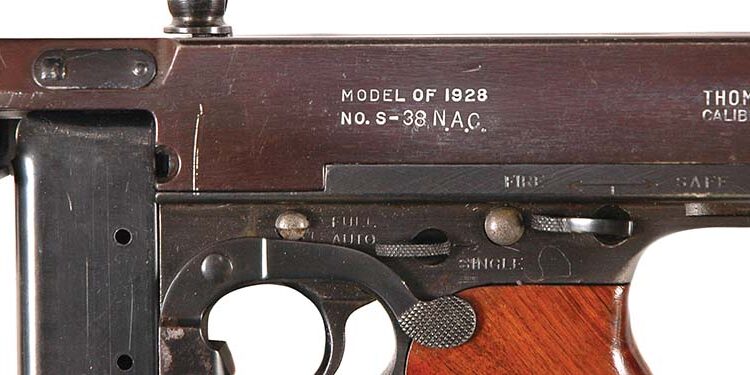By Tom Davis, Jr.
Part One of The NAC Thompson Guns provided an historical overview of how George Numrich and Numrich Arms Company of Mamaroneck, New York, (now located in West Hurley, New York) originally acquired all rights and interest in the world famous Thompson submachine gun. Included in this purchase were complete Thompson guns and many crates of parts that allowed the future manufacture of what are now known as the NAC or crate Thompsons. Part One ended describing the Colt NAC’s. Part Two begins with:
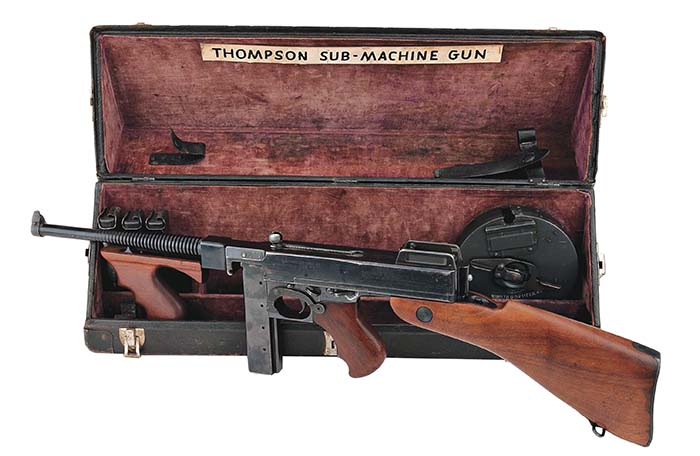
THE SAVAGE NAC’s
After the initial lot of late Colt receivers were serial numbered for registration purposes, it appears there was a switch to late production Savage Arms receivers. Known Savage Arms receivers with NAC markings include:
NAC 17: The US military nomenclature, “U.S. Model Of 1928 A1” and “S –,” is marked on this Savage Arms receiver. The serial number NAC 17 was hand stamped beside the “S -” roll marking. FOIA information begins with a June 5, 1953 transfer to a “Virginia State Agency.” Most likely, NAC 17 was sold to the Department of State Police in Richmond, Virginia with many of the NAC Thompsons with Colt receivers listed above. This NAC Thompson was one of many Thompsons featured in The Thompson Collectors Association 2004 display at the National Rifle Association William B. Ruger Gallery in the National Firearms Museum.
NAC 33: Only pictures of this NAC Thompson have been reviewed. It was built on a late variation Savage receiver with Model of 1928 and S – markings. The serial number, NAC 33, is hand stamped after the “S -” marking. It is very similar to NAC 34, below.
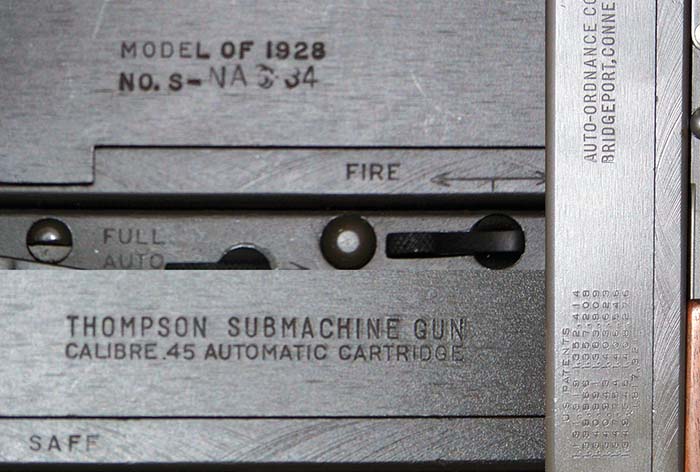
NAC 34: The serial number of this “Model of 1928” NAC Thompson is also hand stamped beside the “S -” roll marking on the receiver. FOIA information reveals it was registered with the IRS on June 10, 1960. Of note, another Form 2 was filed on June 21, 1960 with the serial number listed as SNAC34. Serial number confusion is common with NAC guns and occurred again during a future transfer. The current owner was told by a former owner this gun may have been previously owned by the famous Hollywood company, Stembridge Gun Rentals. The name, “Stembridge Gun Rentals,” is handwritten on the top of the June 21, 1960 IRS Form 2. NAC 34 has been professionally refinished. (Dan Shea verified that there was a Thompson Serial Number NAC34 in the Stembridge collection he sold in 1998. It was N838 in the LMO appraisal).
Just when the numbering is starting to make sense another series of serial numbers with the letters NAC used as a serial number suffix surfaced. J. Curtis Earl described this variation in his now famous catalogs as being “produced” by Numrich Arms with “composites of new and surplus parts” and “readily determined by the “NAC” after the serial number.” Earl labelled these NAC Thompsons as “Commercial 28s” with “poor quality in workmanship.”
S38NAC: This NAC Thompson clearly indicates not all the Thompson receivers were located by Numrich employees when the Thompson assets were transferred to West Hurley, New York. S38NAC is built on a late model Savage Arms receiver marked Model of 1928 and uses the roll marked “S -” marking applied by Savage Arms as part of the registered serial number. FOIA information indicates it was “born” on the National Firearms Registration and Transfer Record (NFRTR), commonly referred to as the NFA Registry, on November 28, 1960. Of note, it was sold by Numrich Arms as a registered dewat on a Form 5 with the following notation: “Gun made unserviceable. Witnessed by ATTD agent.”
S214NAC: This NAC Thompson is very similar to S38NAC, above, but has the U.S. Model of 1928 A1 nomenclature markings. Another difference is the mating of the 1928 Savage Arms receiver to an M1 Thompson frame. Again, Numrich Arms used whatever parts available. Of note, this NAC Thompson was born on the NFA Registry on September 22, 1972. This may indicate not all the receivers found by Numrich employees were 100% finished. Some receivers may have required additional machining operations to complete the product. Of note, this Thompson was registered 3 years before Auto-Ordnance Corporation, West Hurley, New York was formed. Most likely, the inventory of receivers and frames found in the crates was nearing the end.
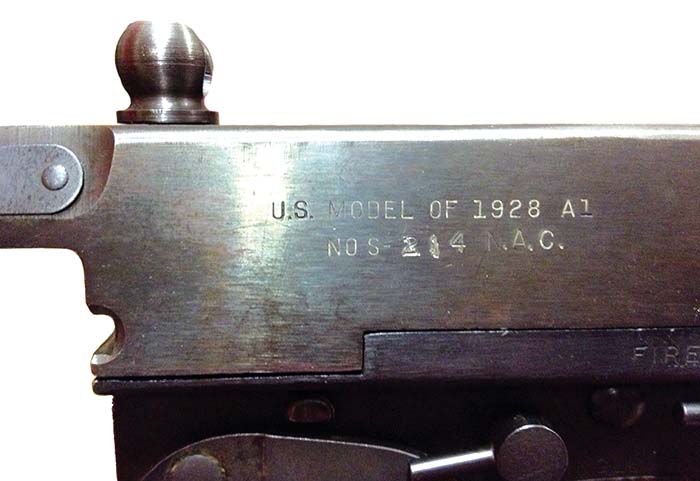
S-15043: Two questions immediately come to mind when seeing this serial number: Is this a NAC Thompson? And is this the third Thompson gun manufactured by Savage Arms in 1940? It is definitely one of the crate guns found by Numrich employees in 1951. S-15043 was registered on an IRS Form 2 stating it was “manufactured, imported, or received” on December 1, 1951. However, unlike NAC 3 and NAC 5, above, the IRS was notified about the registration of S-15043 by Numrich Arms on or about January 14, 1952. The receiver stamped with serial number S-15043 was mostly likely in the first lot of guns and receivers found by Numrich employees. It is not the third Thompson manufactured by Savage Arms as that receiver would have been marked with a New York address. The S-15043 serial number is crudely hand stamped on this late Bridgeport, Connecticut Savage receiver but the receiver is mated to the original S-15043 frame – which obviously was found in the crates. The letters NAC were not part of the registered serial number but appear to have been hand stamped on the receiver before this Thompson was originally sold to the Village of Liberty Police Department, New York, on August 15, 1952 by the Numrich Arms Company. A previous owner removed most of the NAC markings from the receiver when S-15043 was refinished.
The early IRS Form 2’s used to register the crate Thompsons and other machine guns initially found contain enough space to list 12 guns on each form. Not every Form 2 filed by Numrich Arms showing the guns “manufactured, imported, or received” on December 1, 1951, has been reviewed. However, enough documentation has been obtained and studied to show the original filings for the crate guns occurred at different times in 1952 and subsequent years.
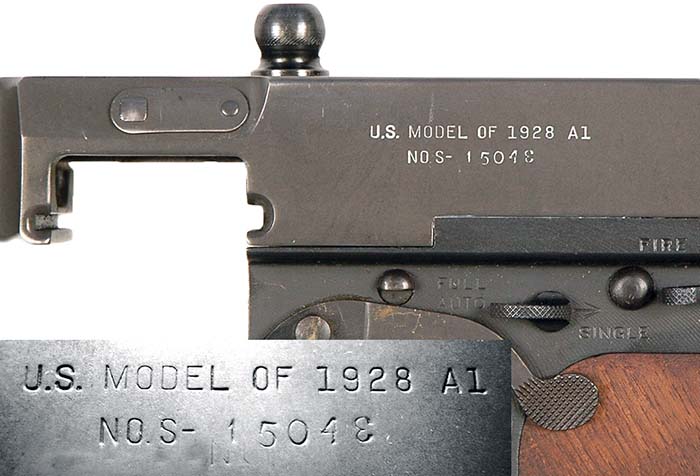
The AUTO-ORDNANCE BRIDGEPORT NAC’s
No Model of 1928 NAC or crate Thompson guns have been identified to date that have been assembled with an original World War II manufactured receiver from the Auto-Ordnance Bridgeport plant. These receivers were roll marked with the serial number prefix “A.O.” (Whereas Savage Arms serial number prefix was “S -”) While examples of this receiver with a NAC serial number may surface in the future, it is possible the Auto-Ordnance Division of Maguire Industries under George Goll assembled and commercially sold all the left over Auto-Ordnance Bridgeport 1928 receivers when marketing the AC variation Thompson.
THE M1 NAC’s
There have only been two M1 NAC or crate Thompson guns observed. The reason for the low number most likely deals with what happened at the end of the Thompson production. The last month of full production for the M1A1 Thompson was December 1943. 31,052 guns were manufactured. No guns were delivered to the US government in January 1944; 4091 guns were delivered in February 1944, the last month of production and delivery. This indicates the government allowed a clean-up period at the end of the production run, December 1943, to allow the vendor, Auto-Ordnance Corporation, to complete ever how much of the product, the Thompson submachine gun, remained on the production line. Of course, the guns delivered had to pass inspection or they would not be accepted (and paid for). This was a common practice at the end of every government weapon production contract and the fact no M1 Thompsons have been observed that were sold by the Auto-Ordnance Division during the marketing of the AC variation at the end of the war indicate very few M1 type receivers were left over.
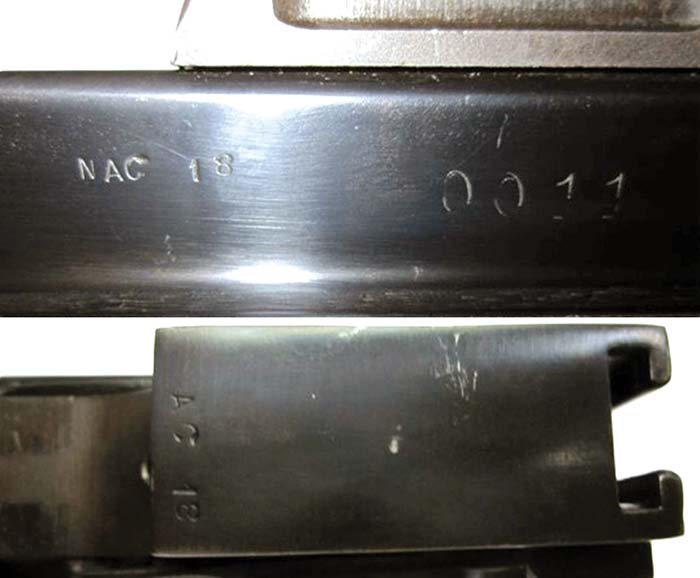
The following two M1 Thompsons with NAC markings have been observed:
NAC18-0011: This M1A1 Thompson was originally sold to the Hammond, Indiana Police Department by Numrich Arms. The date of sale is unknown but it can be verified the Hammond, IN police department was involved in trading this M1A1 NAC Thompson in July 1971. The receiver of NAC18-0011 is devoid of all markings except the serial number and a very small marking or emblem of unknown origin. It has been commercially blued, equipped with a Lyman adjustable rear sight and compensator (on a smooth barrel). The numbers making up the serial number are in two different positions on the receiver. The trigger guard is marked, “AC 18” on bottom.
N.A.C. – 45: As the pictures reveal, N.A.C. – 45 is something special to behold. One look would make anyone think twice about saying anything negative about the crate Thompsons. Aside from the beautiful engraving, a close look at the receiver indicates it is from a special part of Thompson history. And leaves little doubt this receiver was found in the crates. Note the oversize hole at the end of the cocking slot on the right side of the receiver. This hole is for the removal of the bolt handle during disassembly. On production M1 and M1A1 Thompson guns the hole, actually one-half of a hole or cut out, is positioned at the center of the cocking slot. N.A.C. – 45 is built on a leftover Savage Arms M1 prototype receiver! The date this receiver was found and registered with the IRS is unknown. N.A.C. – 45 was sold by Numrich Arms in July 1963 to an individual buyer. The earliest Form 4 indicates “Numrich Arms Company, Williams Lane, West Hurley New York” is both the transferor and manufacturer. The original purchaser recorded that he had ordered a Model of 1928 Thompson with compensator from Numrich Arms for $200 or $225. Numrich was unable to supply a Model of 1928 in a timely manner and offered him N.A.C. – 45 instead for $300. The only change to this NAC Thompson from when it was originally purchased is the replacement of a GI blue bolt with a jeweled nickel bolt. The original production serial number on the frame has not been removed and obviously does not match the receiver. It is equipped with a Lyman adjustable rear sight, finned barrel and compensator.
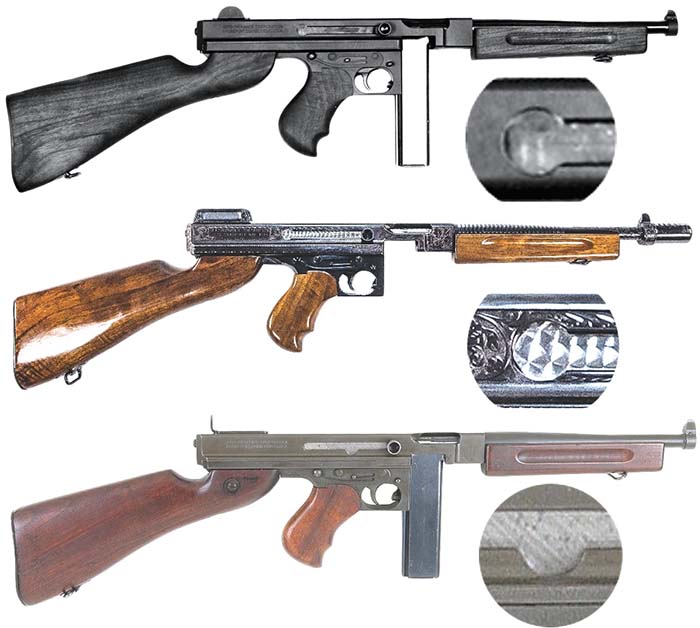
WORLD WAR II PRODUCTION GUNS WITH THE LETTERS “NAC” AFTER THE SERIAL NUMBER
While the focus of this story is predominantly about the crate Thompsons, there is another group of NAC marked Thompsons that also cause a lot of confusion in the marketplace. This other group of NAC Thompsons found their way on the NFA Registry because the importation of live machine guns into the USA for civilian ownership was legal in the 1950’s and 60’s. Numrich Arms, active in all things Thompson, acquired and sold a good number of these early imported Thompsons. For reasons unknown, Numrich Arms stamped the initials “NAC” on many, perhaps all, of the Thompson guns they acquired and sold prior to the creation of the new Auto-Ordnance Corporation, West Hurley, New York. The NAC letters usually appear as a serial number suffix and may or may not be part of the registered serial number that appears on the NFA Registry. The rule of thumb used to tell a production GI Thompson from one of the crate Thompsons is the serial number and overall condition of the gun. If the serial number is a normal production serial number, especially with a matching numbered frame, and the gun does not appear to be a parts guns (but may be arsenal or depot rebuilt) then it is most likely a World War II production gun that Numrich Arms acquired and sold at some point in the past. Savage Arms NO. S – 234572 NAC, pictured in this story, is a perfect example of an original production Thompson guns with the added NAC markings.
The number of World War II production Thompson guns with the letters NAC as a serial number suffix in the marketplace appears to greatly outnumber the crate Thompsons. However, many enthusiasts and dealers continually confuse these two variations. To be sure, any Thompson with the letters NAC must be examined carefully to insure a correct pedigree. Past IRS or ATF documents, coupled with Freedom of Information Act records can be helpful in providing a clear answer. No genuine World War II production Thompson has been examined with the letters NAC as a serial number prefix – to date.
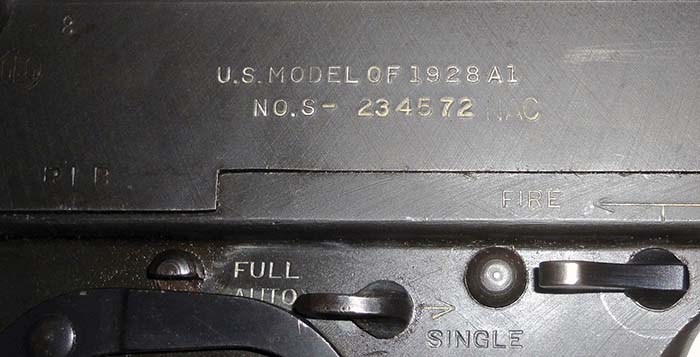
TAKING WHAT IS KNOWN A STEP FURTHER
Why have only Colt and Savage Arms 1928 receivers been identified as Model of 1928 NAC or crate Thompsons? The complete answer may never be known as the people involved in the production of the WWII Thompson guns have long since passed. However, part of the question has been addressed in the M1 section, above. It is very possible the change over in production from the Model of 1928 to the M1 Thompson did not have a clean-up period. Thompson guns were in dire need by all allied forces in 1942. Why would a for-profit company go to the time consuming task of completing the manufacture of unsold 1928 Thompson guns when it could instantly embark on the production of the new replacement Thompson gun – the M1 model. The number of “AC” variation Thompsons found in the marketplace today and documented as sold by George Goll’s Auto-Ordnance Division indicate many Model of 1928 receivers were simply set aside. While fodder for another story, those that study the “AC” variation can identify at least three specific Auto-Ordnance Bridgeport serial number blocks for the “AC” variation. For whatever reason, the employees that assembled and marketed the “AC” variation did not use the excess or left over Savage Arms and Colt era receivers packed away in the Thompson assets by Savage Arms when the contract ended. These receivers were uncovered by Numrich Arms employees in 1951/1952 – and probably for years afterwards.
The late variation Colt receivers used in the manufacture of the earliest NAC Thompsons have often been described as “overruns.” This would indicate Colt’s had unused fully completed receivers on hand when the production ended and gave these receivers to Auto-Ordnance. The most likely scenario is these late variation receivers were manufactured as spare parts and sold to Auto-Ordnance as were other spare parts. Normally, there is not much giving away of product between a contractor and subcontractor. Defective, unused or unsold steel parts at gun factories are routinely routed back to the foundry to be melted down for other uses.
During a production run of any weapon, many of the parts manufactured are turned into tools or jigs for use by the employees. A receiver was just another part, especially in production performed years ago. This may explain the odd numbers and markings found on some of the NAC Thompson receivers listed above. These numbers or markings were stamped on the receivers for a specific purpose or identification. Unfortunately, their meanings will most likely remain lost to time. The explanation could be as simple as a training aide for new employees. This would explain why these receivers or “tools” were packed away with the gages, tools, blueprints and other items used in production – awaiting a new assembly line in the future.
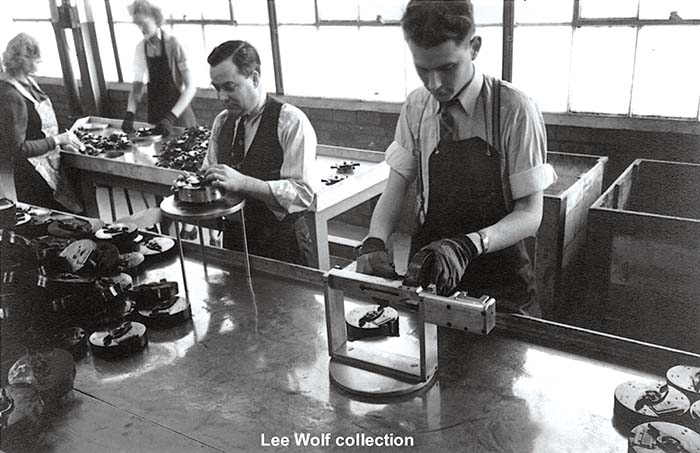
EPILOGUE
To recap, there are numerous World War II Thompson guns in circulation with the letters “NAC” applied as a suffix to an original production serial number. The vast majority of these Thompsons are true World War II guns acquired and sold by Numrich Arms. Colt manufactured receivers with the letters NAC as any part of the serial number should not be confused with original Colt production Thompson submachine guns. These are NOT original Colt Thompsons. They are a unique Thompson variation that has their separate place in the history of the Thompson gun. The same holds true for NAC Thompsons manufactured at Numrich Arms with unused Savage Arms receivers. These NAC Thompsons are NOT World War II production GI Tommy Guns. The NAC or crate Thompsons are a distinctive Thompson submachine gun in their own right – manufactured by one of the product owners during the long succession of General Thompson’s trench broom.
| This article first appeared in Small Arms Review V20N7 (September 2016) |



